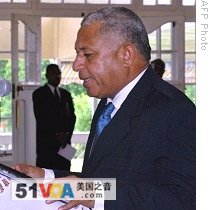Sydney
15 April 2009
Fiji's military ruler accuses judges of trying to force him to call elections. But since the judiciary was dismissed and the constitution was scrapped by the government last week, the country's weak economy has suffered more.
 |
| Fiji's military chief Commodore Bainimarama being sworn in as interim PM during ceremony in Suva, 11 Apr 2009 |
Military chief dismisses judiciary
The court ruled that his 2006 power grab was illegal, prompting Fiji's president, a close ally of Commodore Bainimarama, to scrap the constitution and dismiss the entire judiciary.
This allowed for the return of the military administration, which is now in a far more powerful position than it has been since it ousted an elected prime minister in December 2006.
No press freedom
The media is being censored, foreign correspondents deported, and critics of Commodore Bainimarama have been arrested or dismissed from their positions. The military has seized control of Fiji's Reserve Bank and has devalued the Fijian dollar by 20 percent in an attempt to boost exports and help an ailing economy.
Tough exchange controls have also been imposed to prevent money from flowing out of the country.
Key tourism, clothing and sugar cane industries are sliding into reverse as the political turmoil hits the Fijian economy.
Situation causing concern
New Zealand's Foreign Minister Murray McCully calls the situation troubling.
"The fact that the military have acted in this way, particularly around the Reserve Bank, shows that they have little understanding of the complexity of that situation and of the damage they could do. ... We cannot stop the Fijian Government from wrecking their economy if they are hell-bent on doing so and it appears that they may well be hell-bent on doing so," said McCully.
New Zealand and Australia have urged Fiji's military to hold elections, demands that Commodore Bainimarama has ignored.
Why was government overthrown?
Bainimarama, a former United Nations peacekeeper, says he was obliged to depose the democratic government because it was racist and corrupt. The military says elections will be held when electoral and political reforms have been completed, although no timetable has been given.
After abandoning the constitution and reinstating the military, President Ratu Josefa Iloilo said Commodore Bainimarama would serve as interim prime minister for the next five years.
The coup in 2006 was Fiji's fourth in 20 years. Analysts say the root of the country's political instability is tension between indigenous Fijians, who make up about 55 percent of the population, and ethnic Indians who were originally brought to the country as laborers in the 19th Century by colonial power Britain.